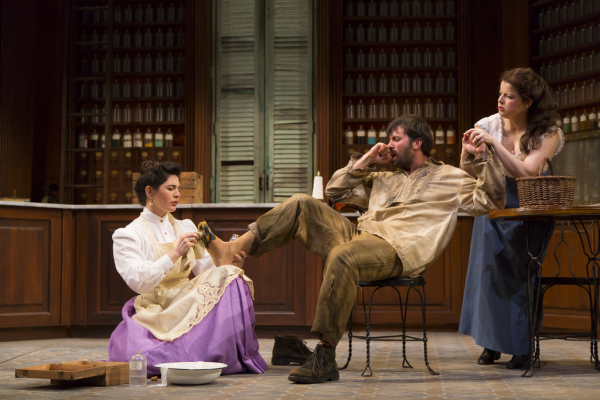Becoming Cuba

(© T. Charles Erickson)
Melinda Lopez’s ambitious and lyrical new drama is set amid the Cuban revolution — not the mid-20th-century one that starred Fidel Castro and Che Guevara but the protracted 19th-century one that culminated in the Spanish-American War. To reach even further back, the playwright throws in the acerb spirits of a Macbeth-quoting conquistador and an island native whose husband was martyred in 1512. Becoming Cuba, which is receiving its second production at the Huntington Theatre Company (where the Cuban-American Lopez is dramatist in residence), is a passionate mix of Cuban history, family drama, love story, baseball, and gunfire, replete with Magical Realist ghosts who waft out at us with as much irony as ectoplasm. With so much going on, it’s amazing that the first act can seem static, but it does — perhaps because there is so much information to impart, not just about the characters and their relationships but about the war and its fabled patriots. But once Becoming Cuba gets cracking, it proves a fierce exploration of loyalty and where, when it becomes necessary, to put it.
In the beginning, the central character’s loyalties are a two-way street. The daughter of a rebel captain who torched his own fields rather than surrender them to the Spanish, the aptly named Adela Fidelidad, is also the widow of a Spanish loyalist wrongly killed in the conflict. The year is 1897, and Adela has more or less sealed herself up in the Havana pharmacy she inherited from her adored husband, dispensing what drugs make it through a blockade and aren’t stolen on the docks to the wealthy Spanish, along with hand cream and candy. Against the war but not sure what she’s for, Adela steers a discreet course while trying to keep a leash on her feisty, patriotic younger sister, Martina, and ward off the romantic overtures of a married American reporter, Davis, who is covering the decades-old conflict for a New York newspaper. But when Adela and Martina’s half brother, the rebel fighter Manny, shows up in need of medical supplies and a hideout, Adela finds it harder and harder to be Switzerland. Both the tension and the poignancy are amped up by the frequent visits of a nervous aristocrat, wife of a sadistic Spanish lieutenant, desperate for relief from a mysterious illness her husband wishes to deny. There is also a cute if kleptomaniacal kid lurking — a sort of Gavroche figure whose purpose in the drama isn’t clear until the fiery end.
M. Bevin O’Gara helms the handsome Huntington production on a set by Cameron Anderson that makes of the pharmacy a burnished, towering bar of bottled tinctures behind which a colorful abstraction of swirling chaos looms. As Adela, Christina Pumariega gives an intelligent if perhaps too cool performance, but Rebecca Soler, as pert, man-hungry Martina, supplies plenty of spark. Christopher Tarjan’s Davis does not make a dashing love interest, but he’s convincing as a smart, sharp-eyed journalist looking to be embedded. As the marchesa seeking morphine, Marianna Bassham manages to be both amusingly shallow and touchingly fragile. Christopher Burns is a lot more likable as the spectral conquistador who appears in a puff of smoke to lecture the audience on the ugliness of the English language than as the cruel lieutenant. And Juan Javier Cardenas, as Manny, presents a ragtag, fervent fighter who transcends guerrilla cliché.
Though it is not her story, Lopez’s great-grandmother was, along with the Arab Spring, the inspiration for the elegantly written if at times confusing drama, the full appreciation of which will be enhanced by boning up on Cuban history before you take your seat. Becoming Cuba, which Lopez has reworked since its debut last year at California’s North Coast Repertory Theatre, is on its way to becoming a fine play, audacious in its mix of history, romance, and droll humor (especially in the metal- and fringe-clad figures of the ghosts). The writer just needs to make more vivid Adela’s journey from bereavement to openhearted, politically committed life and relegate some of the history, albeit fascinating, to the program notes because it gets in the way.










